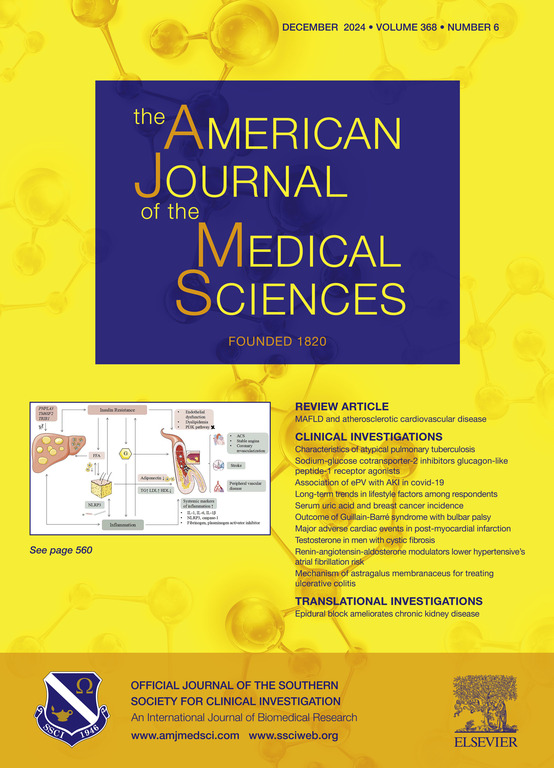Elevated triglyceride-glucose index as a predictor of carotid plaque incidence: Insights from a comprehensive meta-analysis
IF 1.8
4区 医学
Q2 MEDICINE, GENERAL & INTERNAL
引用次数: 0
Abstract
Background
Early detection of carotid plaque (CP) can help reduce the burden of ASCVD in the general population. CP and triglyceride-glucose index (TyGi) are associated with insulin resistance.
Objectives
We performed a meta-analysis exploring the association of TyGi levels with the incidence of CP.
Methods
A systematic search of PubMed, Scopus, and Google Scholar till September 2023 reporting TyGi and CP identified 67 studies, of which 13 met our study criteria. TyGi was assessed both categorically and continuously. Binary random-effects models used for pooled odds ratios (OR) with 95% confidence intervals (CI) and I2 statistic for heterogeneity.
Results
Analyzed data from 163,792 patients with a mean age of 53 ± 8.9 years, primarily female (51.5%). Common comorbidities were hypertension (42.4%) followed by dyslipidemia (24.3%). Multivariable analysis showed that high vs. low TyGi quartile was associated with a higher risk of CP with unadjusted OR (1.82, 95% CI [1.5 - 2.21], p < 0.01; I² = 95.77, p < 0.01) and adjusted OR (1.3, 95% CI [1.16 - 1.46], p < 0.01; I² = 79.71, p < 0.01). Increasing TyGi also had a higher risk of CP with unadjusted OR (1.53, 95% CI [1.15 - 2.03], p < 0.01; I² = 98.48, p < 0.01) and adjusted OR (1.23, 95% CI [1.11 - 1.35], p < 0.01; I² = 89.82, p < 0.01). The association was validated by sensitivity analysis.
Conclusion
Our study indicates a higher risk of CP in patients with higher TyGi scores, underscoring its significance as a predictor for carotid atherosclerosis.
作为颈动脉斑块发病率预测因子的甘油三酯-葡萄糖指数升高:综合元分析的启示。
背景:颈动脉斑块(CP)的早期检测有助于减轻ASCVD在普通人群中的负担。CP和甘油三酯-葡萄糖指数(TyGi)与胰岛素抵抗有关:我们进行了一项荟萃分析,探讨了 TyGi 水平与冠状动脉粥样硬化发病率的关系:截至 2023 年 9 月,我们在 PubMed、Scopus 和 Google Scholar 上系统检索了 67 项报道 TyGi 和 CP 的研究,其中 13 项符合我们的研究标准。对TyGi进行了分类和连续评估。二元随机效应模型用于汇总赔率(OR)及95%置信区间(CI)和异质性I2统计:分析了 163 792 名患者的数据,他们的平均年龄为 53 ± 8.9 岁,主要为女性(51.5%)。常见合并症是高血压(42.4%),其次是血脂异常(24.3%)。多变量分析显示,TyGi四分位数高与低与CP风险较高相关,未调整OR(1.82,95% CI [1.5-2.21],p < 0.01;I² = 95.77,p < 0.01)和调整OR(1.3,95% CI [1.16-1.46],p < 0.01;I² = 79.71,p < 0.01)。TyGi越高,CP风险也越高,未调整OR(1.53,95% CI [1.15-2.03],p< 0.01;I² = 98.48,p< 0.01)和调整OR(1.23,95% CI [1.11-1.35],p< 0.01;I² = 89.82,p< 0.01)。这一关联通过敏感性分析得到了验证:我们的研究表明,TyGi评分越高的患者罹患CP的风险越高,这凸显了TyGi作为颈动脉粥样硬化预测因子的重要性。
本文章由计算机程序翻译,如有差异,请以英文原文为准。
求助全文
约1分钟内获得全文
求助全文
来源期刊
CiteScore
4.40
自引率
0.00%
发文量
303
审稿时长
1.5 months
期刊介绍:
The American Journal of The Medical Sciences (AJMS), founded in 1820, is the 2nd oldest medical journal in the United States. The AJMS is the official journal of the Southern Society for Clinical Investigation (SSCI). The SSCI is dedicated to the advancement of medical research and the exchange of knowledge, information and ideas. Its members are committed to mentoring future generations of medical investigators and promoting careers in academic medicine. The AJMS publishes, on a monthly basis, peer-reviewed articles in the field of internal medicine and its subspecialties, which include:
Original clinical and basic science investigations
Review articles
Online Images in the Medical Sciences
Special Features Include:
Patient-Centered Focused Reviews
History of Medicine
The Science of Medical Education.

 求助内容:
求助内容: 应助结果提醒方式:
应助结果提醒方式:


